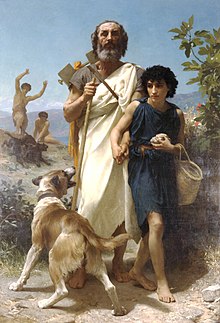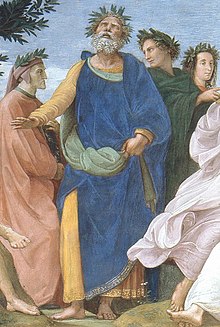Homer
[7] Homer's epic poems shaped aspects of ancient Greek culture and education, fostering ideals of heroism, glory, and honor.[14] Many accounts of Homer's life circulated in classical antiquity, the most widespread that he was a blind bard from Ionia, a region of central coastal Anatolia in present-day Turkey.They include that Homer was blind (taking as self-referential a passage describing the blind bard Demodocus),[20][21] that he resided at Chios, that he was the son of the river Meles and the nymph Critheïs, that he was a wandering bard, that he composed a varying list of other works (the "Homerica"), that he died either in Ios or after failing to solve a riddle set by fishermen,[22] and various explanations for the name "Homer" (Ὅμηρος, Hómēros).Though the crowd acclaimed Homer victor, the judge awarded Hesiod the prize; the poet who praised husbandry, he said, was greater than the one who told tales of battles and slaughter.[27] The earliest preserved comments on Homer concern his treatment of the gods, which hostile critics such as the poet Xenophanes of Colophon denounced as immoral.[30] As a result of the poems' prominence in classical Greek education, extensive commentaries on them developed to explain parts that were culturally or linguistically difficult.[28] Fifty years later, the English scholar Richard Bentley concluded that Homer did exist but that he was an obscure, prehistoric oral poet whose compositions bear little relation to the Iliad and the Odyssey as they have been passed down."[28] Friedrich August Wolf's Prolegomena ad Homerum, published in 1795, argued that much of the material later incorporated into the Iliad and the Odyssey was originally composed in the tenth century BC in the form of short, separate oral songs,[34][35][28] which passed through oral tradition for roughly four hundred years before being assembled into prototypical versions of the Iliad and the Odyssey in the sixth century BC by literate authors.[34][35][28] Wolf and the "Analyst" school, which led the field in the nineteenth century, sought to recover the original, authentic poems which were thought to be concealed by later excrescences.[28] Starting in around 1928, Milman Parry and Albert Lord, after their studies of folk bards in the Balkans, developed the "Oral-Formulaic Theory" that the Homeric poems were originally composed through improvised oral performances, which relied on traditional epithets and poetic formulas.[48] Martin Litchfield West has argued that the Iliad echoes the poetry of Hesiod and that it must have been composed around 660–650 BC at the earliest, with the Odyssey up to a generation later.[51][52] Scholars continue to debate questions such as whether the Trojan War actually took place – and if so when and where – and to what extent the society depicted by Homer is based on his own or one which was, even at the time of the poems' composition, known only as legends.The Homeric epics are largely set in the east and center of the Mediterranean, with some scattered references to Egypt, Ethiopia and other distant lands, in a warlike society that resembles that of the Greek world slightly before the hypothesized date of the poems' composition.Some contemporary scholars think the destruction of Troy VIIa c. 1220 BC was the origin of the myth of the Trojan War, others that the poem was inspired by multiple similar sieges that took place over the centuries.[57] Most scholars now agree that the Homeric poems depict customs and elements of the material world that are derived from different periods of Greek history.[60][61][62] The decipherment of Linear B in the 1950s by Michael Ventris and continued archaeological investigation has increased modern scholars' understanding of the Bronze Age Aegean civilisation, which in many ways resembles the ancient Near East more than the society described by Homer.Linguistic analysis suggests that the Iliad was composed slightly before the Odyssey and that Homeric formulae preserve features older than other parts of the poems.), Homeric formulae ('and then answered [him/her], Agamemnon, king of men', 'when the early-born rose-fingered Dawn came to light', 'thus he/she spoke'), simile, type scenes, ring composition and repetition.For instance, the main words of a Homeric sentence are generally placed towards the beginning, whereas literate poets like Virgil or Milton use longer and more complicated syntactical structures.He noted that Homer often, when describing frequently recurring activities such as eating, praying, fighting and dressing, used blocks of set phrases in sequence that were then elaborated by the poet.





Homer (disambiguation)Homerus (disambiguation)Homeric (disambiguation)Homeric GreekEpic CycleOdysseyAncient Greekepic poemsancient Greek literatureAgamemnonAchillesTrojan WarOdysseusIthacaliterary languageAeolictransmitted orallyDante AlighieriDivine ComedyVirgilAlexander PopeThe questionaccounts of Homer's lifeclassical antiquityAnatolialegendaryWilliam-Adolphe BouguereauHomeric HymnsContest of Homer and HesiodepigramsLittle IliadNostoiThebaidCypriaEpigoniBatrachomyomachiaMargitesCapture of OechaliaPhocaisAncient accounts of HomerDemodocusriver MelesCritheïsHadrianEpicasteNestorTelemachusLife of HomerAlcidamasHesiodWorks and DaysPleiadeshusbandryHomeric scholarshipHomeric QuestionscholiaXenophanesTheagenes of Rhegiumallegoriesclassical GreekHellenisticStoicsByzantineEustathius of ThessalonicaJohn Tzetzeseditio princepsDemetrios ChalkokondylesBibliothèque Nationale de FranceFlorenceRenaissanceFrançois Hédelin, abbé d'AubignacRichard BentleyPisistratusFriedrich August WolfWorld War IMilman ParryAlbert LordRichard JankoBarry B. PowellHerodotushopliteinhumationMartin Litchfield WestBabylonSennacheribSack of ThebesAshurbanipalGregory NagyHistoricity of the IliadMediterraneanEthiopiaHeinrich SchliemannHisarlikTroy VIIaBronze AgeIron AgeMycenaean periodhelmet made of boar's tusksLinear BMichael VentrisAegean civilisationHectorThe ParnassusRaphaelMount ParnassushexameterIonic Greekdactylic hexameterepithetsAthenasimileMiltonparataxistype scenesprayingchiastic structureAeneidA Reading from HomerLawrence Alma-TademascribeGreek alphabetAlexandriaCiceroLibrary of AlexandriaZenodotusAristophanes of Byzantium